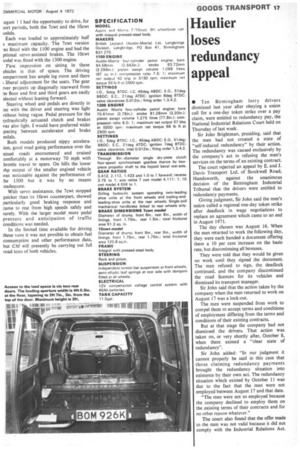Haulier loses redundancy appeal
Page 19

If you've noticed an error in this article please click here to report it so we can fix it.
• Ten Birmingham lorry drivers dismissed last year after obeying a union call for a one-day token strike over a pay claim, were entitled to redundancy pay, the National Industrial Relations Court held on Thursday of last week.
Sir John Brightman, presiding, said that the men had not created a state of "self-induced redundancy" by their action. The redundancy was caused exclusively by the company's act in refusing the men's services on the terms of an existing contract.
The court rejected an appeal by E. and J. Davis Transport Ltd, of Stockwell Road, Handsworth, against the unanimous decision of the Birmingham Industrial Tribunal that the drivers were entitled to redundancy payments.
Giving judgment, Sir John said the men's union called a regional one-day token strike after deadlock in wage negotiations to replace an agreement which came to an end in August 1971.
The day chosen was August 16. When the men returned to work the following day, they were each handed a document offering them a 10 per cent increase on the basic rate, but discontinuing all bonuses.
They were told that they would be given no work until they signed the document. The men refused to sign, the deadlock continued, and the company discontinued the road licences for its vehicles and dismissed its transport manager.
Sir John said that the action taken by the company when the men returned to work on August 17 was a lock-out.
The men were suspended from work to compel them to accept terms and conditions of employment differing from the terms and conditions of their existing contracts.
But at that stage the company had not dismissed the drivers. That action was taken on, or very shortly after, October 8, when there existed a "clear state of redundancy".
Sir John added: "In our judgment it cannot properly be said in this case that those claiming redundancy payments brought the redundancy situation into existence by their own act. The redundancy situation which existed by October 11 was due to the fact that the men were not employed between August 17 and that date.
"The men were not so employed because the company declined to employ them on the existing terms of their contracts and for no other reason whatever."
The court also found that the offer made to the men was not valid because it did not comply with the Industrial Relations Act.








































































































